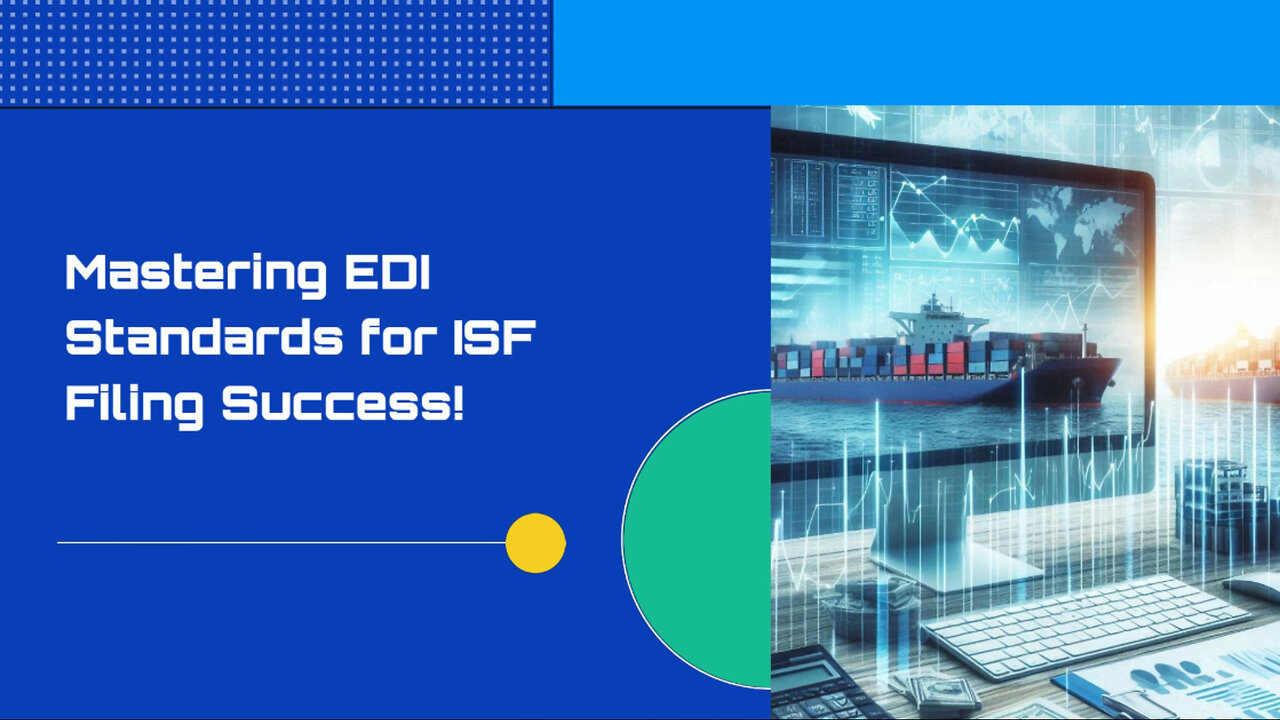Premium Only Content

Mastering EDI Compliance: Streamlining ISF Filing for Smooth Customs Clearance
ISF Checklist || 805-970-7918 || contact@isfchecklist.com || www.isfchecklist.com
In today's episode, we discussed the importance of EDI standards compliance in ISF filing. EDI, or Electronic Data Interchange, is the process of exchanging structured data electronically between different computer systems. In customs brokerage, EDI enables the efficient and automated exchange of information between importers, customs brokers, and Customs & Border Protection (CBP).
ISF filing, or Importer Security Filing, is a mandatory requirement for all ocean shipments entering the United States. It involves providing CBP with crucial trade-related data before the cargo is loaded onto the vessel at the foreign port of origin. By complying with EDI standards in ISF filing, customs brokers ensure that the information provided is accurate, consistent, and easily processed by the customs authorities. This helps in expediting the clearance process, minimizing errors, and avoiding penalties or shipment delays.
EDI standards compliance also helps customs brokers in managing the customs bond requirement. A customs bond is a financial guarantee that ensures CBP of the payment of required duties, taxes, and fees by the importer. By adhering to EDI standards, customs brokers can seamlessly and efficiently validate and verify bond information during ISF filings.
Furthermore, EDI standards compliance facilitates smooth communication and collaboration between trade partners involved in the import process. By using standardized data formats and protocols, different entities can exchange information electronically, reducing paperwork and increasing accuracy in data transmission.
EDI standards compliance in ISF filing improves supply chain visibility and enables effective risk assessment. Customs authorities can analyze the data received through EDI to identify potential security threats and target high-risk shipments for inspection. This helps enhance national security and promotes smooth trade flows.
To stay ahead, customs brokers need to stay updated with the latest EDI standards and regulations. This requires investment in robust information systems, training personnel, and maintaining strong partnerships with technology providers and industry associations.
In conclusion, EDI standards compliance is crucial for customs brokers as it enhances efficiency, accuracy, and security in ISF filing and the overall customs processes. It is a vital component of modern-day customs brokerage operations and a key driver of success in the international trade landscape.
#usimportbond #isfcustomsbroker #uscustomsclearing #isfentry
Video Disclaimer Here: This video is purely educational and has no ties with the US government.
00:45 - Importance of ISF Filing
01:09 - Benefits of EDI Compliance
01:30 - Customs Bond Requirement
01:59 - Facilitating Trade Communication
02:26 - Supply Chain Visibility and Compliance
-
 2:13:05
2:13:05
The Nerd Realm
9 hours ago $2.57 earnedNew Years Eve! Fortnite Hunters w/ YOU! Creator Code: NERDREALM
40.2K3 -
 LIVE
LIVE
FusedAegisTV
1 day agoNYE Eve! - 2025 Incoming 🎉 - 12hr Variety Stream!
1,093 watching -
 1:18:52
1:18:52
Awaken With JP
12 hours agoSomehow The World DIDN’T End This Year! - LIES Ep 72
126K71 -
 1:19:34
1:19:34
Michael Franzese
10 hours agoWhat 2024 Taught Us About the Future?
106K29 -
 1:48:09
1:48:09
The Quartering
10 hours agoBird Flu PANIC, Sam Hyde DESTROYS Elon Musk & Patrick Bet David & Woke Witcher?
115K69 -
 4:47
4:47
SLS - Street League Skateboarding
3 days agoLiz Akama’s 2nd Place Finish at SLS Tokyo 2024 | Best Tricks
46.6K3 -
 4:06:54
4:06:54
LumpyPotatoX2
9 hours agoHappy New Year Rumble ! - #RumbleGaming
33.2K -
 10:37
10:37
One Bite Pizza Reviews
1 day agoBest of Barstool Pizza Reviews 2024
59.8K32 -
 2:37
2:37
Tate Speech by Andrew Tate
11 hours ago2025 WILL BE YOUR YEAR
102K37 -
 3:51:31
3:51:31
Sgtfinesse
12 hours agoRumble New Years Eve with Sarge
63.4K